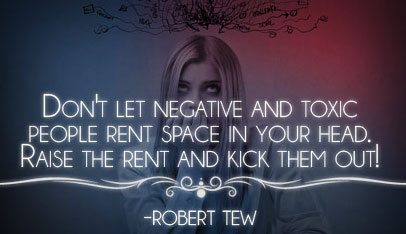Life
2 Ways to Stay Positive When Dealing With Negative People
We all have to deal with negative people at some point in lives, we just do. Sometimes we can avoid them, other times we can’t. Sometimes these negative people stay for a little while, other times they stay long enough to make us want to jump off a bridge.
But since we know it’s a fact of life that negative people exist, what can we do deal with Negative Nancy and Pessimistic Peter?
Understand They Have Different Values
There are times when the negative people we have to deal with aren’t always negative, they just happen to be really negative in certain situations.
When I started college, I was an engineering major. I did really well in school and got accepted into a summer internship program with one of the biggest oil companies in the world. It was awesome. I performed so well in the internship program that they brought me back the following summer. After the second summer I was told I had a full time job waiting for me once I graduated.
But unfortunately, not only did I turn down that high paying job offer, I left the engineering major entirely! I realized that engineering wasn’t my passion and I began studying small business management instead.
My family wasn’t so thrilled about the idea. I was going to be the first one in my family to get a college degree, and the fact that it was going to be an engineering degree made my family ecstatic because they knew that a degree in engineering meant financial security. That’s what was important to them, a nice steady paycheck with great benefits.
So when news broke that I was changing my major, my family voiced a lot of concerns and brought a pretty negative attitude to the situation. They kept reminding me of the time that would be wasted and the big payday that would never come. It was tough to hear, and it even made me second-guess my decision.
But I had to go back and remind myself of what my values were. What was important to me? Delivering something of significance to world the world, and I felt that a degree in engineering wouldn’t allow me to really reach my potential.
I valued significance, my family valued security. We couldn’t have been further apart from each other.
Once I realized that we had such a big difference in values on the topic, it made it a lot easier for me to tune out the negative comments and energy they were sending my way.
Take Responsibility for Your Own Happiness
Negativity is contagious. It’s easy for someone else’s negative thoughts to slowly creep over and start affecting you in a negative way.
But positivity is also contagious, so when someone is giving you a lot of negative energy, you have to fight back with positive energy. You can’t allow someone else’s negativity to become yours. Just because Negative Nick doesn’t think it’s a good idea for you to go after your dreams, that doesn’t mean you have to think it’s a bad idea too.
You have to be responsible for you own happiness and positivity. If we break down the word responsibility we get “response – ability”. Responsibility is simply your ability to respond.
You don’t have the power to choose what life throws at you, or what these negative people do and say to you, but, you do have the ability to choose how you respond and that’s what’s most important.
You can choose to respond in way that lets the negativity drains your positivity and makes you feel hopeless and frustrated, or you can choose to respond in way that makes you work even harder and focus even more on the positive aspects of the situation.
The dictionary defines responsibility as “the opportunity or ability to act independently and make decisions without authorization”. That means you don’t need an ok from anyone else to act on something that you’re responsible for. So even when the negative people disagree with you, who cares?
It helps if you ask yourself,
- “What can I do to reinforce my positive attitude?”
- “What can I do to discredit their negative attitude and opinion?”
Your happiness depends more on your own attitude than any external factors. So don’t let the negative people of the world get you down.

Did You Know
How Skilled Migrants Are Building Successful Careers After Moving Countries
Behind every successful skilled migrant career is a mix of resilience, strategy, and navigating systems built for locals.

Moving to a new country for work is exciting, but it can also be unnerving. Skilled migrants leave behind familiar systems, networks, and support to pursue better job opportunities and a better future for their families. (more…)
Life
10 Research-Backed Steps to Create Real Change This New Year
This New Year could finally be the one where you break old patterns and create real, lasting change.

Every New Year, we make plans and set goals, but often repeat old patterns. (more…)
Life
9 Harsh Truths Every Young Man Must Face to Succeed in the Modern World
Before chasing success, every young man needs to face these 9 brutal realities shaping masculinity in the modern world.

Many young men today quietly battle depression, loneliness, and a sense of confusion about who they’re meant to be.
Some blame the lack of deep friendships or romantic relationships. Others feel lost in a digital world that often labels traditional masculinity as “toxic.”
But the truth is this: becoming a man in the modern age takes more than just surviving. It takes resilience, direction, and a willingness to grow even when no one’s watching.
Success doesn’t arrive by accident or luck. It’s built on discipline, sacrifice, and consistency.
Here are 9 harsh truths every young man should know if he wants to thrive, not just survive, in the digital age.
1. Never Use Your Illness as an Excuse
As Dr. Jordan B. Peterson often says, successful people don’t complain; they act.
Your illness, hardship, or struggle shouldn’t define your limits; it should define your motivation. Rest when you must, but always get back up and keep building your dreams. Motivation doesn’t appear magically. It comes after you take action.
Here are five key lessons I’ve learned from Dr. Peterson:
-
Learn to write clearly; clarity of thought makes you dangerous.
-
Read quality literature in your free time.
-
Nurture a strong relationship with your family.
-
Share your ideas publicly; your voice matters.
-
Become a “monster”, powerful, but disciplined enough to control it.
The best leaders and thinkers are grounded. They welcome criticism, adapt quickly, and keep moving forward no matter what.
2. You Can’t Please Everyone And That’s Okay
You don’t need a crowd of people to feel fulfilled. You need a few friends who genuinely accept you for who you are.
If your circle doesn’t bring out your best, it’s okay to walk away. Solitude can be a powerful teacher. It gives you space to understand what you truly want from life. Remember, successful men aren’t people-pleasers; they’re purpose-driven.
3. You Can Control the Process, Not the Outcome
Especially in creative work, writing, business, or content creation, you control effort, not results.
You might publish two articles a day, but you can’t dictate which one will go viral. Focus on mastery, not metrics. Many great writers toiled for years in obscurity before anyone noticed them. Rejection, criticism, and indifference are all part of the path.
The best creators focus on storytelling, not applause.
4. Rejection Is Never Personal
Rejection doesn’t mean you’re unworthy. It simply means your offer, idea, or timing didn’t align.
Every successful person has faced rejection repeatedly. What separates them is persistence and perspective. They see rejection as feedback, not failure. The faster you learn that truth, the faster you’ll grow.
5. Women Value Comfort and Security
Understanding women requires maturity and empathy.
Through books, lectures, and personal growth, I’ve learned that most women desire a man who is grounded, intelligent, confident, emotionally stable, and consistent. Some want humor, others intellect, but nearly all want to feel safe and supported.
Instead of chasing attention, work on self-improvement. Build competence and confidence, and the rest will follow naturally.
6. There’s No Such Thing as Failure, Only Lessons
A powerful lesson from Neuro-Linguistic Programming: failure only exists when you stop trying.
Every mistake brings data. Every setback builds wisdom. The most successful men aren’t fearless. They’ve simply learned to act despite fear.
Be proud of your scars. They’re proof you were brave enough to try.
7. Public Speaking Is an Art Form
Public speaking is one of the most valuable and underrated skills a man can master.
It’s not about perfection; it’s about connection. The best speakers tell stories, inspire confidence, and make people feel seen. They research deeply, speak honestly, and practice relentlessly.
If you can speak well, you can lead, sell, teach, and inspire. Start small, practice at work, in class, or even in front of a mirror, and watch your confidence skyrocket.
8. Teaching Is Leadership in Disguise
Great teachers are not just knowledgeable. They’re brave, compassionate, and disciplined.
Teaching forces you to articulate what you know, and in doing so, you master it at a deeper level. Whether you’re mentoring a peer, leading a team, or sharing insights online, teaching refines your purpose.
Lifelong learners become lifelong leaders.
9. Study Human Nature to Achieve Your Dreams
One of the toughest lessons to accept: most people are self-interested.
That’s not cynicism, it’s human nature. Understanding this helps you navigate relationships, business, and communication more effectively.
Everyone has a darker side, but successful people learn to channel theirs productively into discipline, creativity, and drive.
Psychology isn’t just theory; it’s a toolkit. Learn how people think, act, and decide, and you’ll know how to lead them, influence them, and even understand yourself better.
Final Thoughts
The digital age offers endless opportunities, but only to those who are willing to take responsibility, confront discomfort, and keep improving.
Becoming a man today means embracing the hard truths most avoid.
Because at the end of the day, success isn’t about luck. It’s about who you become when life tests you the most.
Change Your Mindset
The Four Types of Happiness: Which One Are You Living In?
Most people chase success only to find emptiness, this model reveals why true happiness lies somewhere else.

In a world driven by rapid technological growth and constant competition, many people unknowingly trade joy for achievement. (more…)
-

 News2 weeks ago
News2 weeks agoBrandon Willington Builds 7-Figure Business by Ignoring Almost Everything
-

 Health & Fitness2 weeks ago
Health & Fitness2 weeks agoWhat Minimalism Actually Means for Your Wellness Choices
-

 Did You Know2 weeks ago
Did You Know2 weeks agoWhy Most Online Courses Fail and How to Fix Them
-

 Business2 weeks ago
Business2 weeks agoIf Your Business Internet Keeps Letting You Down, Read This
-

 Business4 days ago
Business4 days agoEntrepreneur’s Guide to Pay Stubs: Why Freelancers and Small Business Owners Need a Smart Generator
-

 Business3 days ago
Business3 days agoThe Simple Security Stack Every Online Business Needs
-

 Finances3 days ago
Finances3 days agoWhy Financial Stress Is One of the Biggest Barriers to Personal Growth
-

 Scale Your Business2 days ago
Scale Your Business2 days ago5 Real Ways to Grow Your User Base Fast


























19 Comments